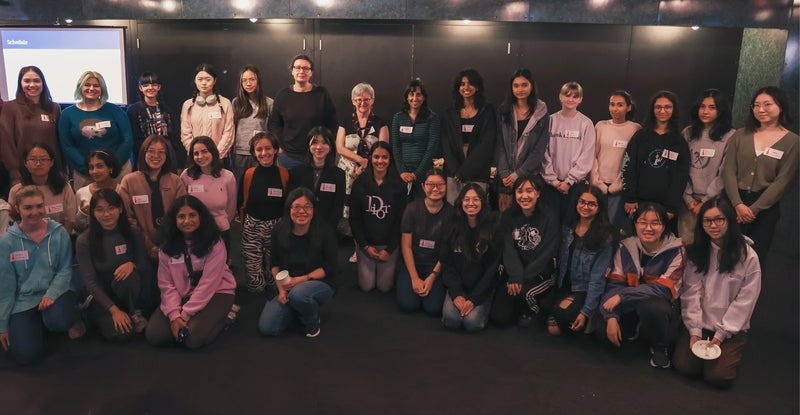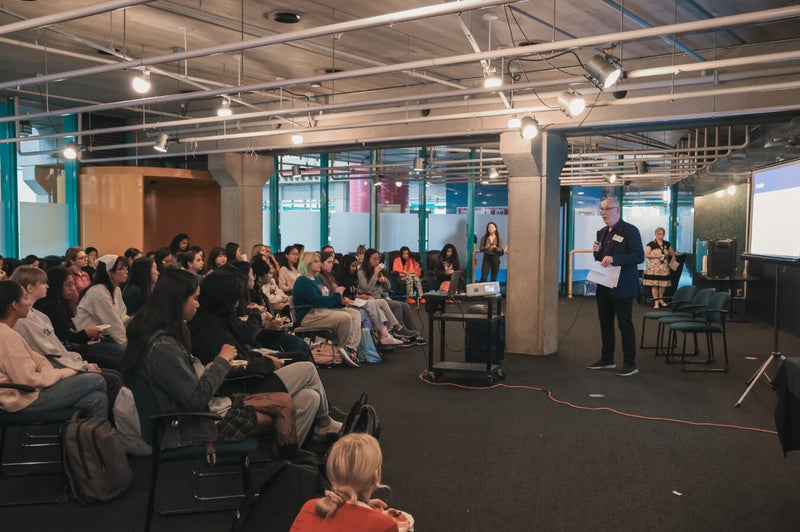
Students and supporters at the undergraduate Women in Math event
This week, Women in Math (WiM) welcomed new undergraduate and graduate students.
At two events, which took place September 13 and 14, returning students and faculty welcomed women and other gender minorities to campus. New students learned about upcoming events, heard from professors and mentors, and had chances to share refreshments and meet their classmates.
In his opening speech for the undergraduate event, Dean Mark Giesbrecht talked about gender bias in society and the underrepresentation of women in STEM positions. He noted that only 34% of Canadians with a STEM degree are women. In his multi-decade career in the Faculty of Math, he said, “one of the most exciting shifts I have had the privilege to witness has been the increased representation of women in the Faculty of Math, and in the University’s STEM programs over all. Still, you know well that we – and society as a whole – still have far to go.”

Dean Mark Giesbrecht addresses students
The undergraduate event also featured welcomes from WiM director and Pure Math professor Yu-Ru Liu. Liu introduced WiM’s feature project, the Directed Reading Program, explaining how it benefits both undergraduate and graduate students and prompts interdisciplinary research. Students also heard from Women in Computer Science (WiCS) director and Computer Science professor Jo Atlee. Atlee emphasized the importance of networking and solidarity between women in STEM, both in university and in the workplace. “One of the best strategies to succeed in a professional field where you are underrepresented is to have a strong network,” she said.
Students also got to hear study tips and ask questions of math instructors and upper-year students. “In my first year I lacked a lot of female peers, so my goal today was to connect more women in math,” said second year Math student and WiM undergraduate student representative Samantha Pater. “I hope to create a safer space and a network for women on campus.”
First year software engineering student Laavanya Thiagalingam was one of the attendees. “Hearing people who have been through it tell you that you can do it too is really empowering,” she said.
The graduate student even on September 14 also included welcomes and Q&As, but took a more informal approach. New graduate students asked questions about many of the unique struggles they anticipated facing in their careers, including accusations of unfair hiring, balancing career goals with maternity leave and serving as mentors and role models for future generations of female students.
Barbara Csima, associate chair-graduate for Pure Math, shared her experience of being a graduate student at the University of Chicago in the late nineties. Her twenty-odd cohort of graduate students had a record seven female students, she said – but none of her professors were women. Today, she’s proud to work in a Faculty with many female colleagues.
“We are students, postdocs, instructors, professors and researchers advocating for an in inclusive atmosphere and promoting gender equity in a field largely dominated by men,” says Stéphanie Abo, PhD student in applied mathematics and graduate student representative for WiM. “We are all at different stages of our journey, and through our conversations, we encourage and inspire each other.”
The coming year will feature numerous social and academic activities from WiM and WiCS, including symposiums and research mentorships. You can learn more about upcoming events and how to get involved on the Women in Math website and Women in Computer Science website.